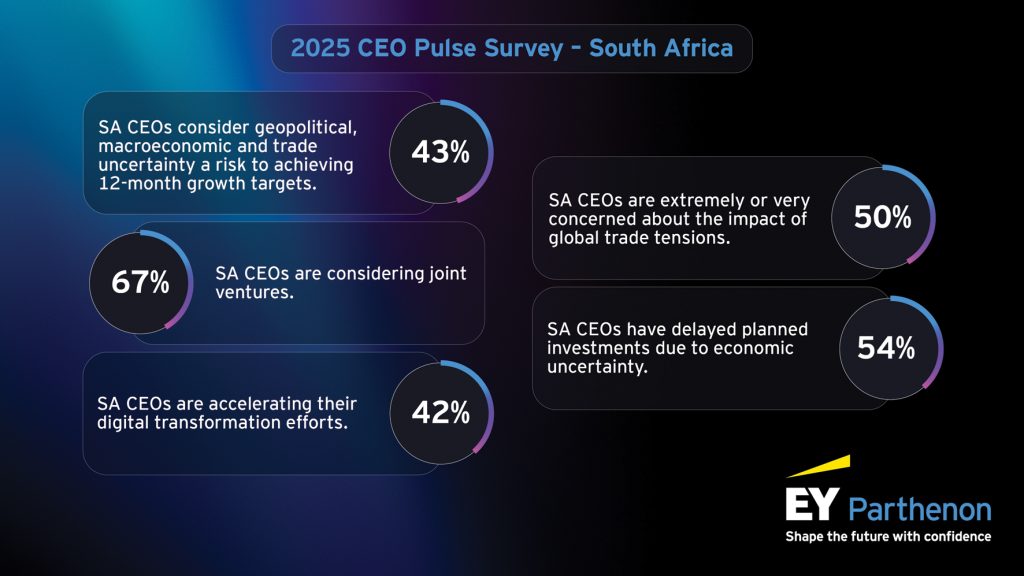Claude Hanan and Luke Jedeikin have quite the story to tell. For roughly 15 years, they’ve been at the forefront of eCommerce and omnichannel business development in South Africa. With brands like Superbalist and Bash under their belts, this duo made the journey from indie startup founders to corporate executives responsible for driving growth in groups like Takealot and The Foschini Group (TFG).
Within TFG, Claude and Luke are redefining how omnichannel retail works in South Africa. This strategy is a core growth engine at TFG and contributes to the group’s moat in South Africa.
But what are the secrets of omnichannel retail and why is it so successful? What sets it apart from eCommerce? And what are the key ingredients that a retailer actually needs before they can take this step, proving that implementation is always much harder than having ideas?
Get ready for an omnichannel masterclass from two of the most respected names in retail in South Africa.
This podcast is brought to you by The Foschini Group and Bash and is for informational purposes only. Please treat it as just one part of your research into companies like The Foschini Group and remember that at all times, nothing included in this podcast should be taken as investment advice.
Listen to the podcast here:
Transcript:
The Finance Ghost: Welcome to this episode of the Ghost Stories podcast. Today we’re going to be learning all about omnichannel retail and eCommerce and all these very exciting things. And there’s honestly no one better to be doing it with than my guests today. So buckle up because we’re in for a really insightful, detailed conversation about retail.
Claude Hanan and Luke Jedeikin, thank you so much for making time for this today. They are the Chief Omnichannel Officers of The Foschini Group. They are the co-founders of Bash, which I think is a name that people will certainly recognize. Anyone who has been following the story of The Foschini Group recently will know the name Bash. Anyone who quite frankly has looked at the list of top downloaded apps in South Africa will know the name Bash.
So well done, gentlemen, and thank you for joining me on this podcast. I’m very excited to get some insights from you. Claude, Luke, welcome.
Claude Hanan: Thank you. Thank you. Thanks for having us.
Luke Jedeikin: Thanks very much. Happy to be here.
The Finance Ghost: Alright, let’s start with – speaking of here, let’s start with how you got here. Let’s go back a little bit because you’ve been at it for a long time together in terms of building eCommerce businesses. And my understanding is literally the word “together” is very relevant there because you’ve been partners for a long time, which is always really impressive. That’s not an easy thing to actually get right. And I’m sure we’ll dig into some of those topics as well.
But I want to really go back to the start in terms of your involvement in eCommerce because you’ve built some businesses before Bash that people will also know. And I’m keen to dig into that story. I’m not sure which one of you wants to kick it off or how you want to tell that story, but let’s get into where it all started?
Claude Hanan: Cool! So it all started – Luke and I have known each other for a very long time. We were at school together. We then studied different things. He studied law. I studied finance. Luke eventually went on to join Ogilvy in the advertising industry and I joined Allan Gray. And I think – clearly we always had entrepreneurial spirit. And the beginning of our story really was when I read an article about Groupon in a Fortune magazine in 2010. I was on a family holiday sitting on an airplane on the runway in Greece and Groupon at the time was the fastest growing business in the history of commerce kind of thing. It was just a hyper-explosive business model. Found it obviously quite intriguing and then came back from the holiday and started speaking to some mates of which Luke was one to understand if anyone had heard of it.
And to our surprise, few people had! So it kind of sounded perfect to us 26-year-olds and we agreed to start a Groupon-type business. That was 2010. We planned it for about nine months. We launched early 2011. By the time we launched there were around 40 clones in the market.
I don’t know if you remember Ghost, the Groupon craze of 2011, Groupon themselves had landed in South Africa. There were just tens of businesses doing exactly the same thing that we were because the barriers to entry were essentially non-existent. It was like a two-page website. You didn’t have to deliver physical goods, your delivery was an email. It was a very easy operating model but not a very good business model. And so immediately we got pretty scared at the ability to not differentiate ourselves and we pivoted into traditional eCommerce round about that time. I’m oversimplifying.
Having to deliver physical goods creates a moat. It’s just a much harder business to run. And customers loved CityMob. Customers loved these discount-oriented businesses, but suppliers didn’t. So we rebranded essentially to improve our source of supply. There was a lot of criticism at the time and unhappy customers. During the rebrand, we rebranded to Superbalist and moved into a traditional retail model that still included a group buying aspect and that was around 2013 and Superbalist was born.
As part of that pivot and naturally moving to something that is harder, that has bigger barriers to entry, it was more expensive to run. So we were naive in that pursuit, in some ways. It was smart in some, it was difficult in others – and we needed to raise money. It was quite clear that when you’re buying inventory – we were up against the likes of Zando at the time, which had funding from Rocket Internet. Spree was part of the Naspers stable. Before that they were Style36. And so our competitors were well funded – Takealot had just raised $100 million at the time and we realised we needed money. To summarise that, the start of the whole story was 2010, we founded CityMob. It was a group buying model. We pivoted into retail, retail found us, we kind of landed there by mistake. We raised money. We then got bought out by Takealot in 2014.
The Finance Ghost: Fantastic. Yeah, I’m keen to hear the Luke version of this because Luke, you were 26, you had studied law, you were working at Ogilvy in marketing, so you’d already disappointed your parents by then – you were clearly not becoming an advocate! So was it a natural thing to just go to them and say, actually on top of all of these things, I’m just going to go and start basically a group buying business with my mate from school and the rest is history. How quickly did you go full-time versus side-gigging this thing?
Luke Jedeikin: Yeah, I YOLO’d into it, or at least my memory is that it was pretty quick. So my story is that the advertising game c.2008/2009, pre-World Cup was still what we call now quite traditional. So the media was still billboards, below the line and above line TV. The industry knew that digital was coming, but it was nascent and the skills within those organisations weren’t really digitally focused or digitally native. And so they were either acquiring businesses or trying to upscale. And Ogilvy created something called the Ogilvy Digital Marketing Academy which was a 10-week course. Each week covered a vertical. For example, mobile would have been hosted by Vodacom or advertising would have been hosted by Google.
And I’m not sure how it happened, but I was lucky enough to be one of the attendees of the first cohort and certainly the youngest. It was designed to upskill the employees of the group really in anticipation of the World Cup which was coming in 2010. You can imagine all the big tier one sponsors suddenly have eyeballs on South Africa and the local guys needed to kind of show that they knew what they were talking about.
And within that digital course, it didn’t actually inspire me to stay in advertising and nibble at digital – it kind of blew my mind and made me super itchy about how big this new market might be. And so when Claude reached out to me with this group buying idea, I was already percolating on how do I get into this digital space. The timing was really good.
I want to say I resigned round about November and was working in anger from like Jan and I think we went live, Claude, maybe Feb/March? Like live, website – it was quick, quick, quick.
Claude Hanan: Yeah, it was quick.
The Finance Ghost: And that’s the barriers to entry we’re talking about, or lack thereof actually. You can go live pretty quickly.
And Claude, your financial background then shines through there because I noted you were on holiday in Greece in 2010 when the Greeks were basically willing to pay you to go there because they were in so much trouble. So well done. That must have been the cheapest overseas holiday basically in history, if I think back to what was going on in the world around that time.
There’s an important lesson in there, actually, which is around the benefit of just reading widely. It’s so cliché – people say just read, but it is also so true. If you hadn’t read about Groupon in that moment, who knows what you guys would be doing today? It might be this, it might not be this. There’s no way to A/B test that.
But the point is, if you can read widely, then you’re going to expose yourself to all these different ideas and you’ve got a good shot at then spotting a gap in the market that led to a business like Superbalist, which is a brand that everyone will be very familiar with, even those who weren’t around at the time of the Groupon craze or weren’t really following that story.
And that’s the business that you eventually sold, so maybe we should move on to that story, actually. I want to hear about the exit of Superbalist. If you look back on it now, what was that process like for you? What was the story there?
Claude Hanan: Yeah. And just to build on that also the naivety. Embracing naivety is super important because it does kind of dwindle as you age. I think Luke and I are a lot more cynical of business ideas today than we were 15 years ago.
The Finance Ghost: It is – sorry, that is so incredibly true. Ignorance is bliss, right? It is absolutely that. It absolutely is. I agree with that 100%. There is something to be said for starting when you are young and full of dreams and the world hasn’t assaulted you yet. It’s remarkable, actually.
Claude Hanan: Yeah. So there we needed money, I think I touched on it. We had gone through two due diligence processes. One with Naspers, which lasted about five or six months. Super thorough. We were this tiny, immature business with teams of lawyers and accountants coming in to scour our documents and try build a view of the business. A little bit like bringing a gun to a knife fight in hindsight from a DD perspective.
Then post that process, they pulled out. There were some global changes in their views on what businesses were appealing to them. So that due diligence failed.
We then immediately started another DD process with a UK hedge fund. That lasted four to five months. Equally thorough. That fell through and then I guess it was somewhat fortuitous – Takealot had just raised $100 million from Tiger Global. We reached out to the CEO at the time and he was keen to meet. The CEO and the CFO personally conducted the due diligence. It took six weeks and the deal was done. Look, timing played a role.
I also, in hindsight, remember feeling remarkably at peace, because it was kind of like the last swing, the last roll of the dice. If we hadn’t raised money or been bought there, we most likely would have had to shut shop. We were losing a decent amount of money. We were like R10 million in debt that we needed to repay to angel investors. But there was this weird confidence that came from knowing that. I just remember it being like quite a strange moment of clarity. We just had to close the round. And we did. And it happened quickly. So that was August 2014. That was actually 11 years ago this week that we sold to Takealot and we got shares in Takealot. There was no liquidity event for us. Our minorities got paid out and then began our Takealot journey.
The Finance Ghost: Yeah, that’s fascinating. I mean, there’s obviously a little bit of a cliché, never-give-up lesson in there, But I mean, two DD’s – one was basically a trade buyer, one was a financial investor. I can only imagine how hard it was to watch both of those DD’s go wrong. Do you think it’s something you could have done differently? Or was it actually just the sign of the times and maybe just a mismatch of potential buyer? Because it sounds like they almost over DD’d you a little bit, as opposed to Takealot, which kind of saw – look, this is what it is, it’s a startup.
Finding the right buyer is more than half the battle won, right?
Claude Hanan: Yeah. I think maybe what was so different between the two – and this was almost suggested to us by the Takealot executive – we were trying to raise money in the first two. In the third, it was an outright acquisition to place within an existing retailer. At the time, Flipkart of India, which is kind of like Walmart/Amazon of India had bought Myntra, which is kind of like the ASOS or Superbalist business. So there was this global trend of infusing a general merch retailer with an apparel retailer.
I think that Luke has spoken about this – if one of the first two deals had succeeded, we would have built a business a fraction of the size that we ended up building. So we actually got incredibly lucky. Like, you never know when you’re getting lucky kind of thing. We were devastated, gutted when those things fell through. It was super tough, but it worked out in the end.
Luke Jedeikin: Yeah. And I think just to add to that, the first two were investors. So they take a look at the P&L. eCommerce businesses are really just fulfilment engines with a skin on the top. And raising money is one thing, but then you inject the money into subscale logistics and you see how it burns. And I think the difference would Takealot was they had leverage. It’s not just about giving money to this entity. It’s like, we can fix this part of your P&L, we’re at scale, we have a fulfilment engine. So from a risk point of view and a strategic point of view, it’s a very different consideration when you’re applying leverage versus just money into a dream.
The Finance Ghost: Yeah, couldn’t agree with that more. If I think back to when I was in my corporate finance days, when you were speaking to someone looking to sell a business, one of the biggest conversation topics was strategic versus financial buyer. Because nine times out of ten, a strategic is going to give you a better price because they can actually unlock something interesting by buying your business. Whereas a financial buyer is literally walking in and doing the sort of five-to-seven-year cash flow forecast and working out the IRR. And it’s got to make sense and they’ll take a big haircut there for risk and then they’ll offer you – it’s the old joke, you make your money on the way into a deal, not on the way out. And if you’re the seller of that business, then you’re the one on the wrong end of that lowball offer effectively.
That’s just the way it is – finding a strategic buyer is always going to be the better outcome. And it sounds like it’s the outcome that you got in 2014. So well done on that. But that of course was just the start in many ways rather than the end. Because as you said, you then went and built a much bigger business within the Takealot stable, so I think let’s do those years.
The gap between that and getting involved in Bash was the period of Superbalist for several years, right?
Claude Hanan: Correct. And it was just such a privilege to be a part of the Takealot group during those years. So 2014 through 2020, there was takealot.com which ended up acquiring kalahari.com. There was Superbalist which we were running. And then there was Mr. D, which was the food delivery business and the backbone logistics business of all three of those consumer facing businesses. And the group went from around R400 million turnover to R6 billion / R7 billion in those six years. So to have a seat on the group executive and witness that kind of growth was just phenomenal. The learnings were second to none.
It was a super intense, high-performance culture in a way that we – we didn’t understand that type of culture actually existed. We came in super green and I guess elements of corporate, but not quite corporate. Just the need for precision day in and day out was like nothing – we weren’t prepared for that. There was a big growth curve for us.
And then in addition to, I guess just the growth curve culturally, we were suddenly managing enormous budgets. So we had this again, privilege, of now growing what would become a household name in retail. TV ads, tens of millions of brands, Google and a digital marketing budget, a big wage bill. And so yeah, we took on that challenge and in hindsight, we were really pleased with where it got to by 2020.
There’s a bit of nuance and backstories in between which we can unpack. But by 2020 we felt we had done what we needed to do. We had reached a billion rand in annual turnover. We had acquired our biggest competitor at the time, Spree. As they were both Naspers companies, there was no point to hold two, and we were ready for the next thing. But Luke I’m sure will have some more colour on, on those six/seven years.
Luke Jedeikin: Yeah, I think just the ambition – so Takealot was backed by Tiger at the time. You had an American hedge fund with an emerging market strategy and the play was: take the market. It was “be big or don’t bother” kind of thing. So from the prior two diligences that we’ve spoken to, which is kind of like: what is your DCF and when do you break even? This was: we’re not interested in that. We don’t do small businesses. We, we want – the mandate is to be the dominant player in every single category. Show us what that looks like.
And so from a forecasting point of view, Claude spoke to precision, but it was also a completely different way of thinking about a business. When you’re kind of looking at survival, now you’re being tasked – can you show me a medium, large and super aggressive growth plan? Show me the aperture of revenue at 65% CAGRs, 85% CAGRs and 100% CAGRs. And show me what that does to the bottom-line cost. Let’s start there. And then they’re like, okay, this is the appetite we have. Choose somewhere between the medium and aggressive.
The Finance Ghost: I mean, that’s the dream, surely, right? As a young startup founder, that’s exactly what you want, isn’t it? Like go make this big. Okay, I’ll do that.
Luke Jedeikin: Absolutely. And in the beginning, it wasn’t big enough! So absolutely a great privilege and I like to think of – it was really just growth university. We learned how to grow, we were doing 85% to 100% CAGR for five years in a row. And that in eCommerce world – you double turnover, you double orders to handle orders, you’re doubling kind of your logistics capability, your customer service capability and with that is: how do you build a culture? How do you stop the wheels coming off? Unusual really – I think unusual in SA to have that kind of ambition. But there we were.
Claude Hanan: The culture thing is a personal obsession and we can touch on it. But what’s unique about those environments and we’ve had similar at Bash considering the growth, is you’re bringing in 5 to 15 new hires on average in any month. Round about season it’s more, but that’s 5 to 15 new personalities. They bring their own views of the world, some of which are super valid. They don’t necessarily understand exactly what we’re trying to achieve here and the paths we’ve walked to date. And so you have to be so deliberate. Hiring is one thing and I think over the years we’ve built up a really good competency in hiring. But onboarding – what happens from day one – is equally critical. You’ve got expensive resources joining the business. How quickly can you get them up and running? How quickly do they feel engaged? And that’s a massive challenge for a high-growth business relative to a mature business.
The Finance Ghost: Yeah, it’s great to hear that kind of journey and the different experience along the way. It makes me think of that typical Dunning-Kruger situation where a lot of people build small businesses and then they think they’ve learned everything and they go, oh well we’ve nailed this, we know everything. And then you go and put yourself in an environment like that and then you realise: actually, I know nothing – the learning curve is vertical again. It’s that “valley of despair” on the Dunning-Kruger chart. I always encourage people, if you’ve never gone and read about Dunning Kruger, go and check it out because it’s a really good framework and you always need to check yourself on where you are on this thing, have you really grown to the point you think you’ve grown to, what do you still have to learn, etc.
And it must have been amazing to go through that journey. You talk about 5 to 15 people a month – it’s incredible growth – that is building a business. I’m under no illusions that my little media operation, which absolutely depends on me getting out of bed on time every morning to get Ghost Mail out, the learnings in that environment – I love what I do, but it’s not going to be that. I don’t ever really want it to be that. That’s another story – to be able to build a culture at that size, bring that many people, get everyone pulling in the same direction. I mean it’s just, it’s fantastic. And I guess in so many ways that primed you for your more corporate life now at The Foschini Group, which I suppose we should move on to in terms of how you guys got involved in Bash.
So the actual exit of Superbalist and then the journey to get into Bash, I think let’s cover that?
Luke Jedeikin: It had been 10 years, around about 2019, Claude and I – I think he mentioned we’d hit some big milestones, turnover milestones, merging with our biggest competitor at the time, which was Spree. We’d had all of this experience that we spoke to, but it was also intense and exhausting and breakneck. So we were somewhere between needing a break and feeling very accomplished, I suppose.
And the business had gone from, I guess, the build phase to the run phase. Claude and I ultimately get our kicks out of building the platform, the brand, the experience, the operational rigour. And I would say the last year and a bit, it was much more like running a generic retailer than it was necessarily a tech business. So all of those things precipitated us deciding it was time. Little did we know it was going to be a global pandemic a year later. And so we agreed to see out the financial year which ended in March 2020, which meant that the first two or three days of hard lockdown were our last days of that tenure. I went into the office over a weekend and packed the box with no one after Cyril’s announcement. And that was the end. There was no big party or ribbon cutting ceremony.
But at that point we kind of decided to just take it easy. We weren’t necessarily sure that we were going to do something together. We were open minded in that time. We were looking for high growth opportunities that Africa or South Africa had some potential leverage in globally and where we could be early, which is where we were in 2010. We actually looked at cannabis as a space. It was looking like SAHPRA was going to start approving things which they since haven’t done as quickly as we thought. We looked at the European markets, the US markets, prepared a business plan in that space. In the end didn’t pursue it.
And I guess in a parallel lane with COVID lockdowns and so on, it simultaneously obviously forced a lot more people into the digital space than ever before. Both businesses and consumers, of course. And we were I guess on the market – restrained for the year, but in that space of deciding what to do, many different entities sniffed around as you can imagine. They were looking for digital skills, I guess under duress. But Claude and I had always had admiration and respect for TFG and saw its potential.
If you see the building blocks of what TFG is versus other listed retailers, other listed retailers are largely monolithic. So Mr. Price is a great brand, but it’s a singular brand, as is Woolworths vs. TFG with at the time, I think 15 or 16 different brands online and another five or so that were yet to be online, but household names spanning multiple commodity categories from furniture to jewellery to apparel and an enormous store footprint. We looked at all of the various assets, said if they stitch this together, we believe of the listed retailers they by far have the biggest structural advantages with an eCommerce hat on.
We, during that period, ended up meeting the current CEO Anthony and the then CFO and it was really just a casual chat about how might we see the world. It wasn’t like an open role or a job. Claude and I went away and I guess it was a bit like a business plan as well. We put together what we thought TFG could do – like a thesis, which the rest is history – it was the bones of bash which is de-duplicate costs, work harder on leverage, point all of the traffic and customers into one place, not 15 to 20 different places. And we think that in summary, you have enormous scale. You just need to concentrate it.
Claude Hanan: The thing I wanted to add, when we were at Superbalist, we would often discuss which of the listed retailers intimidated us in terms of their online potential. And for reasons Luke’s described, TFG was the one if they were to consolidate all of these properties.
Of course quite a difficult thing. On paper it makes great sense. Tens of millions of customers, a credit offering, 20-odd internal brands, 300+ third party brands on the platform, 3,000+ stores. Putting that all together is a super compelling proposition – commercial proposition and customer proposition.
Getting it done in hindsight took a lot. Anthony and the board were bold and they had the vision and they agreed with the potential. And we can talk to it later in the show, specifically regarding capital markets day. The one point we wanted to land there was that those hard yards have now been done on paper. A lot of things make sense for these listed multinational conglomerates, getting them done is quite different. But the vision was there and through a ton of persistence, we’re now on the other side. And that theory, that thesis came true. It’s paid dividends, it worked damn well. Customers have reacted positively.
The Finance Ghost: Yeah, what’s that Guy Kawasaki quote? Ideas are easy, implementation is hard – never truer words spoken, honestly. But I think you also mentioned earlier, I mean, I heard stuff like how eCommerce is a fulfilment engine. I think you used the word “skin” at one point. So it makes sense if you’re bringing the skin, you want to go and find the biggest, meanest body to go and put it on, right? And add the most value. So I can understand exactly what the appeal with TFG was in that context.
And it’s amazing that once again then you guys ended up working together because as you said, Luke, that wasn’t actually guaranteed. I’m sure you are extremely happy that you didn’t wade into the cannabis world, which I think has claimed many scalps along the way. I don’t think that that’s gone nearly as well as many people thought it was going to. So definitely the right play to go, eCommerce, especially with what’s happened in the world. And some of that you would have foreseen and some of that would be luck, right?
Maybe that’s a good thing to ask you next is in terms of the last few years and eCommerce adoption and growth, did you guys see this coming or has this surpassed even your expectations of where things have gone? Because five years ago no one understood what on-demand grocery was. You know, what do you mean a scooter is going to bring me my food in the next 40 minutes reliably? That doesn’t make sense. I need to go to the shop now! It’s crazy. And now the expectation is just, no, this is just the most normal thing in the world. It’s a non-event, it’s amazing.
Claude Hanan: We did a piece of research on why eCommerce is even growing. I think firstly, a point we often like to reiterate is we’re not eCommerce evangelists, we’re technology evangelists, digital evangelists. Because those two things unlock enormous value in any business and very much in the retail sense apply to the physical stores as much as online stores. So just parking that for now.
In terms of eCommerce, why is eCommerce growing so much? Firstly, it’s this explosion of choice. If you look at Amazon and Shein, they’ve just got an unimaginable amount of SKUs on offer in the hundreds of millions, with tens of thousands going live every day. So this explosion of choice is just far better suited to a digital channel. The customer experience of navigating through all that is much better online.
Tightly linked to that is for each year that passes, there are more and more digital natives who are entering the workforce. Even engaging with someone five years younger than you are – or we are – never mind 10 years or 15 years, you see just how comfortable they are with digital channels. And customer expectations have changed in that regard.
And the third one linked to that you’ve touched on it is just the improvement in fulfilment and service design. The experience has just improved so much over the past 10 years. It’s often genuinely enjoyable to shop online. Those three things combined have led to this explosion. But Africa remains remarkably behind the curve. You know, there’s Euromonitor data that I saw quite recently, it’s actually pretty fascinating just how small the online penetration is in Africa versus pretty much all other continents. So there should still be a ton of upside. It’s growing, but it was off a very low base and there should be more growth still.
The Finance Ghost: I would agree with that. I always use TFG’s results actually as a good gauge for eCommerce penetration because TFG has businesses in Australia and the UK as well. And obviously the disclosure always includes the online sales penetration rate. So that’s – TFG has always been very useful for me actually to see that difference in adoption here versus overseas. And there’s a million reasons for that. But I do think that the trend is definitely up in terms of adoption. I can see it when I read stuff like the big Real Estate Investment trusts who own shopping centres, a lot of their disclosure is talking about flat footfall or sometimes slightly down. And then average basket sizes tend to be going up on shopping trips. So what’s happening is people are going less frequently to the shopping mall, they’re making more of a trip of it, but they’re going less frequently. Why? Because they’re buying online.
And obviously, what’s interesting, and you know, as I introduced you at the beginning, it was not Chief Online Officer, it was Chief Omnichannel Officer, which is actually about getting digital to work with the store footprint. So we will definitely get into that. This is not online only.
Actually, we may as well do it now, why not? So why do you think it is that omnichannel actually is what works really well? And I’ll mention one – with my limited exposure to retail – I guess the one story that always sticks with me and now it’s part of Mr. Price is Yuppiechef. I remember reading at one point that Yuppiechef – I mean, it was online only for a long time and it was only really when they started actually getting a store footprint and they went omnichannel that things really started happening for them. And credit to Mr. Price, they’ve done well with that business, TFG doing really well on the omnichannel side as well.
What is it about omnichannel that you think works so well versus purely online? Because obviously you’ve had amazing exposure to both.
Luke Jedeikin: If you look at an online P&L, your biggest cost areas are going to be fulfilment and going to be marketing or customer acquisition – because you live in a virtual space, you can’t buy physical real estate and attract footfall – and people.
So structurally, if you look at augmenting online with brick and mortar, which is omnichannel on the customer side, you see much lower customer acquisition costs. Because stores essentially do two things. They are both a customer acquisition asset – there’s billboards in every single mall pushing a brand – and they are simultaneously a fulfilment asset. They hold stock, they’re close to customers, they’re in strategic locations. And if you use them as jump off points to deliver from or collect from, it’s hugely advantageous.
So in raw numbers, your fulfilment costs are meaningfully lower than a pure-play and your customer acquisition costs are meaningfully lower than a pure-play. And so if you’re smart about leveraging that, there are clear advantages.
And then when you look at South Africa, geographically, South Africa is three times the size of Germany. It’s a big place. So if you have a centralised pure-play fulfilment model, you can have the most advanced DCs in the world with lasers and robots and whatever else, but you’re still putting something on a truck that needs to go a large distance. So having a massive store footprint where you’re moving freight from DC to store, as opposed to fine picking logistics on a unit basis, your cost advantage is phenomenal. It’s very easy just to see, being as familiar as we are with a pure-play P&L and then looking at those inputs from omni and for that reason we knew we would break even quickly, but we’ve broken even two years quicker than we even imagined because of these factors.
The Finance Ghost: Yeah, that was one of the headline points actually from the capital markets day, which we’ll touch on now. Before we get there, I just want to mention I read – it was Walmart that released results this week – and I mean, their digital growth is also really strong. But the one point that comes through there as well is fulfilment from stores is growing really, really, really, really quickly because it’s like having a little DC much closer to where that person is. And the stuff is designed to be picked off the shelf as one or two of, as opposed to there’s a whole box of this stuff in a warehouse. And I think even if you’re not in the retail space, you just think logically through that. You can imagine how much easier it is to go and pick out of a store and fulfil an order than it is to go and pick out of a warehouse and fulfil an order. It’s taking something out your kitchen cupboard versus looking in the boxes in your garage that you should have unpacked three years ago and you haven’t. It’s that kind of thing, isn’t it?
Luke Jedeikin: Absolutely. And that’s the cost advantage, but it also brings a speed advantage -distance and time. So, if you look, there’s a very interesting chart and you look at the growth of Amazon, for example, so Amazon over the geography of Northern America on the X-axis is time, and you can see they kept adding DCs to get closer and closer to customer in the various regions. And as they did that, in the Y-axis is speed of delivery. So the average speed of delivery improved. It went from 10 days to five days to standard and three days. And then they could start offering same day and more recently same hour delivery. But that journey took them many years, more than 15 years. And Walmart, which was late to the party, has, I can’t remember the exact figure, but numerous supercentres they call them, which are these large retail environments. And they kind of went: hold my beer – we’ve got all this distribution and we’re able to pivot those into omni fulfilment locations and offer comparative speed at comparative cost very, very quickly. And then if you look at the factors of customer retention, so ultimately lowering your acquisition costs because your same customers purchase more frequently and you lose less of them. In eCommerce, you can look at all the various factors: price, price elasticity, choice, and all of these things matter. But one of the most profound, if not the most profound, is speed of delivery. And so if you can accelerate your ability to deliver things really quickly to customers, the retention rate flywheel dramatically hockey sticks. And that’s exactly what you’ve seen in Sixty60, the best example – from zero to household name in two years. Why? Because they unlocked those locations and provided one-hour delivery. And you know, it’s kind of a well understood playbook. Omnichannel retailers are incredibly well positioned in that regard.
The Finance Ghost: And the big loser in that space from a grocery perspective, which is obviously way outside of scope for this podcast but just something I’ll mention is Spar. Because Spar’s business was always around convenience. It was on your drive home, it was at your little strip mall nearby. You’d stop off there after work. And now actually a lot of people are ticking that box by getting a scooter to bring them stuff. And Spar, they couldn’t go and implement something similar because of course it’s this disparate group of franchisees as opposed to all of these corporate-owned stores like you have at Woolworths, like you have at Shoprite and like you have at most of Pick ‘n Pay, but not all. So it is just very interesting to see.
Again, the idea can be easy. Sometimes the implementation can be really hard. And I think that’s a good opportunity to talk about the implementation that you guys have done at TFG with the team there from a Bash perspective. Because I think if someone hasn’t been into one of the stores and experienced it, it’s actually kind of hard to listen to these esoteric terms like omnichannel and online – and it’s like, okay, what does this even mean? Is it just a website?
Actually no. I’ve seen it myself in the store with the machines. It almost turns each salesperson into a little entrepreneur actually, where there’s clearly incentivisation directly linked to those sales etc. I think as we maybe touch on some of the key points you want people to know about Bash and from the capital markets day for that matter. I think we should definitely just spend a couple of minutes on what it is that Bash is doing differently from an omnichannel perspective in the stores. What is actually making this thing work? What does the plumbing look like?
Claude Hanan: I think just for some context for the listeners – we in the last five minutes have spoken about why the eCommerce P&L is more profitable for an omnichannel retailer. And I think that’s pretty well established and clear. But now it’s almost the other side of the coin of the digital capabilities going into stores. The thinking behind Bash Store, which it was originally called, but is essentially just an endless aisle capability and referred to now as omniselling inside TFG, is to allow a customer to shop TFG’s entire range from within any store. And so the easiest use case is footwear. How many times have we all gone into a store, asked for a size 9 or 10 in a style you like – there is no 9 or 10. What often happens in retailers across the world is either there’s general apathy, just, sorry, can’t help you, or, you know, worst case, why don’t you go try our competitor across the hall? Or we can pick up the phone and see if another store has the stock and then arrange an IBT of that unit to come back to the store. What Omniselling allows is it’s a handheld device with a version of the Bash app on that device, and the customer will tap on glass, pay for that item there and then, and that item will get delivered either to their home or to a store that they can come back to as a click-and-collect delivery. So it completes the sale there and then, which is beneficial for the company and the customer. And the customer has the comfort that it’ll be coming to them in the next few days.
It’s a pretty simple concept. It works well in many retailers abroad. I think it’s fairly profound, though, in what it can do to stockturn, to store densities. It’s using existing stock, it’s using existing staff, it’s using existing properties, existing leases and the cost of these devices is a few thousand bucks. It’s super scalable and we think really exciting and we’re just kind of touching the surface of the potential at the moment.
The Finance Ghost: Yeah, I mean, it’s all about consumer behaviour, right? You’re removing a friction point because why does someone go to the store – because they want to see something. Maybe there’s some casual browsing element to it. I think people do still do that, but they specifically want to see something or try it on or touch it or whatever the case is.
But there’s almost – oh, they probably won’t have the colour I like or the size – online at least, I can know for sure whether I’m going to get the thing I want, I just can’t see it first. And it’s this constant interplay of do I want to see it and take the risk on them not having it versus do I just want the solution, but then I don’t know if I’m going to like it.
And this kind of plugs that gap, right? So I come to the store, have a look at it, try it on. Sorry, we might not have exactly the one you want, but don’t worry about it. Before you go, you’ve locked in the sale, customer’s happy, there’s no additional friction. And this is something I’ve learned by building the media business that I have is, it’s insane the drop-off rate as soon as someone has the slightest amount of friction in any process. You ask them to click one more time, you ask them to type one more thing, you ask them to take one more step in a particular direction and it’s like all too difficult. And until you’ve actually experienced that, it’s so hard to understand. And I think that’s a big part of what Bash is addressing, right?
Luke Jedeikin: Yeah, exactly. And I think it’s a really interesting point. The whole culture around digital experiences is to be conversion rate obsessed. The entire industry, whether you look at MarTech, various SaaS tools etc. is just iterating all the way down the funnel from login to search to add-to-cart to pay and looking for fine margins of conversion rate upside by reducing friction. And that’s now become so normal that it’s turnkey in the shape of a WooCommerce site or a Shopify site. There’s entire app ecosystems within those environments dedicated to adding recommendations or upselling or whatever. By and large, stores put all of that overhead on their employees. The employees have to have the wherewithal to do the upselling job. The employers have to do the wherewithal to read between the lines and understand what the customer does or doesn’t want and what opportunities there are for upselling or cross-selling, etc.
And so on the one hand, there’s no doubt that In South Africa, 90% of consumers prefer to be assisted by a human being. But what this does is it provides those human beings with digitally-enabled superpowers, going you have a device now that kind of augments both of those behaviours. The device will tell you what the next most likely thing the customer is going to buy. But you can still do the assisting and the selling.
And where we experienced that in quite a profound way – we went to Brazil where this behaviour is quite well entrenched across Brazilian brick-and-mortar retailers or omnichannel retailers. And the expectation is just the service level in store is now profoundly better because they can always help you, they can always get what you want. To Claude’s point, the expectation from these retailers is that they’re always in stock, might not be physically on site, but of course they can get you what you need. And so much so that when polled five years ago and Amazon was entering the Brazilian market, average Brazilian consumers – now this is Amazon who is supposed to be the most service or customer-centric business in the world, that’s their mission, to be the most customer-centric business in the world – in Brazil, they believe that Amazon has poor service and you’re like what? It’s like, yeah, they can’t help you because you get hold of a call centre and they can’t describe the product, they don’t know what they’re talking about versus these omnichannel enabled stores it’s fantastic, you can go, you can speak to a human, they hold your hand and they give you all the benefits of Amazon. You still have the selection and the choice and the ways to pay, but a warm-bodied human being can hold your hand.
And we found that really remarkable because we were in a pure-play environment which is all about removing humans from the picture, just ratings and reviews and automation etc. And to see it turned around and how compelling that is for an emerging market experience, which is give me the human touch, albeit solve problems digitally. So yeah, it’s been super interesting as an experience.
The Finance Ghost: So what I’m hearing is when you’re reading about Groupon in Greece or you’re going to visiting stores in Brazil, the more you travel and the more you expose yourself to what’s out there in this world and the more you read as an entrepreneur, the better your business will do. I think that’s a pretty well-established fact.
You’ve actually created the perfect opportunity there for me to ask you about data and AI which is something I did want to cover off before we bring this to a close. So you talked about conversion rate obsessed. You’ve talked about the human element and getting the mix right of the machine and the human. How does AI and data play into your world? Because that is the one great thing with online. I mean certainly when I was reading that Walmart earnings transcript, the management team continuously drives the point home to the analyst audience of: you’ve got to see our eCcommerce business as also powering the advertising side, also powering our membership model, powering the fact that we have all this data on people and we can then give them personalised offers, etc. In your guys world, and obviously to the extent you can talk about it, how important, how real is this AI thing? How real is the data thing? Are people just paying lip service or do you think that there’s genuine business drivers of this stuff?
Claude Hanan: Yeah, I think absolutely, genuine business drivers. Look, the data piece can’t be disputed and we’ve often said actually that a retailer with an impressive eCommerce business, it’s almost like an indication of how mature they are digitally as an organisation. Because you need a lot of things in place before you can be good at eCommerce. And at the very bottom of that pyramid is data, robust data architecture. And it needs to be fast, it needs to be democratised, it needs to be accurate. And it really drives everything we do and has always done so from way back in 2012. There’s no team, no decision, no process that does not benefit from a metric or some kind of data insight. We absolutely love it. I think Luke and I as individuals revere data. So that shows up in the organisations that we run.
On the AI side, I guess it’s debatable. I’ve been spending a lot of time in the last two months actually trying to understand it because I didn’t understand it very well. I enrolled to a Wharton University online course, AI for Business. And the one thing that I’ve understood now is it’s actually more about machine learning. Because if you look at these AI models, what consumers think or call AI, like these LLMs, these chatbots, it’s artificial intelligence because it approximates human reasoning. Under the hood it’s a machine learning algorithm and its advancements in machine learning, most notably these transformers that use pattern recognition to almost feign human reasoning, there’s ML under the hood. So if you think about the teams at these businesses, at Anthropic, at OpenAI, at Amazon, at Walmart, they are teams who are focusing on machine learning. And machine learning is super valuable in so many ways, specifically like – I mean maybe another word for machine learning is predictive analytics. Getting really good at forecasts, getting more intelligent at how you predict things, be it inventory, being the location of your stock, the type of stock you order, how you design your fulfilment network.
So, I think the a-ha moment for me recently, I guess it’s twofold. Number one, we have to build up a machine learning capability and that is driven by, in terms of the skill set, it’s operations, research, engineers, it’s applied mathematicians, and we do have a small and growing team of that internally to get really good at using predictive analytics for your operations. Then there’s this craze of LLMs and traditional AI which can 10x a lot of people in terms of their productivity and what they do, which is also a huge opportunity. But personally I’m probably more passionate about the former.
The Finance Ghost: I can imagine at Wharton, when they saw Claude has signed up for this AI thing, they must have thought that Anthropic is sending their model actually to come and see what they’re all about. You must be tired of Claude AI jokes. Maybe you aren’t. Whether you are or aren’t, I’m still going to make one. I’m sorry, it’s just how it is.
Claude Hanan: No all good. I don’t hear them too often.
The Finance Ghost: Okay, there we go. We’ll have to change that. Luke, you were going to say something intelligent before I made dumb jokes.
Luke Jedeikin: No, I think Claude’s spot on. At the core, AI doesn’t work unless you have quality data. I mean that’s really well understood. And retailers that have eCommerce that’s working implies they have quality data. Because you know, what is a product? What is your product called? Do you have metadata against that? Product sizes, materials, colours, are those organised in a taxonomy that is searchable and indexable? And all of this stuff sounds trivial. I guarantee you at 90% of retailers it’s a total mess because they grow over decades by osmosis, acquisitions, etc. and unifying all of that stuff and playing with ERPs etc is scary and difficult.
So TFG is there. How you use that data through machine learning models, to Claude’s point, is step two. What I will say though is the consumer shift into LLMs as a tool – I mean you look at the adoption numbers, they’re just hockey sticking for OpenAI, for Claude, etc. – is real and it’s obviously going to start disintermediating firstly, the way we search for things on Google, so our prior vintage of Internet research. And also the number of websites, apps and experiences designed to give you information are being disintermediated. The web as we know it is about: show me where the answer is, I’m looking for flights, cool go to this flight website. I’m looking for recipes. Fine, go to this cooking website. Where now LLMs, just give me the answer, synthesise that information and give me the answer.
So retail won’t be spared. The expectation is that products and inventory too will need to show up in those environments. I’m asking where I can get a Springbok Jersey. I expect that Springbok Jersey to show up inside of ChatGPT. And of course we need to prepare for that world. I don’t think it’ll be entirely in that environment. You know, these waves of digital transformation as we’ve seen, tend to shift the channel mix, but it won’t be entirely in an LLM environment, but a meaningful share will start to move there. But to Claude’s point, if you have strong eCommerce, you are well positioned to enter that environment. Those retailers that aren’t even mature in eCommerce today are going to get smashed for obvious reasons.
Claude Hanan: They’ve got a long road to walk. And you know, this is one of the points we made at capital markets day, that we’re as TFG on the other side of that and that is worth a helluva lot in this environment. Foundations have been built. We now have the optionality of deciding where we want to go with it. The platform’s there. Where should we take it?
The Finance Ghost: Yeah, I could not be more bearish on Google myself. I mean, my own search behaviour has changed completely. I always see Amazon talking about the benefit of searches starting inside Amazon and that’s obviously how this advertising revenue is coming through at the likes of Walmart as well. So things are changing. It feels like everything is going against Google right now rather than with them. But we’ll obviously see how that plays out.
You two have a very big business to run and build, not least of all given some of the interesting stuff that was shared at capital markets day. So I think as we start to bring this to a close, let’s spend the last few minutes of this podcast just talking about, for those who haven’t gone and checked out the capital markets day presentation on Bash, go and have a look, it’s on the TFG website. Go look at the entire capital markets day again. The more you read, the more you learn. Sometimes even while you’re on a runway in Greece, you never know what comes from what you read!
So from a capital markets day perspective, what are just one or two key takeouts that you would love the listeners to this podcast to leave with and to encourage them to maybe go and check out that capital markets day deck regarding Bash, omnichannel and TFG specifically?
Claude Hanan: I think we’ve maybe touched on a few of the. So the one is that as a group, we’ve committed to resourcing the frontline with these omniselling devices and that is a really exciting development and will differentiate our stores from competitors. And the second from my side is just the fact that so many of the hard yards have now been covered.
To build – one mustn’t underestimate the boldness of the vision when we were originally brought on by Anthony. And that’s just the starting point. That was four years ago. The execution that’s happened between then and now, technically, culturally, it has not been easy, but it’s done and it’s a success and it means great optionality for the next decade and a type of optionality that many competitors don’t have.
Luke Jedeikin: I think that’s spot on. And I think part of the work we did was to try just continue to forecast where the market’s going. South Africa is an environment that’s borderline ex growth at a GDP level. And so a retailer like TFG that has a meaningful online asset that is mature stands to enjoy CAGRs in its online business of somewhere between 15% and 20% over the next five years. And I think the importance of that asset in the years ahead versus those who don’t have it cannot be understated within the current economic conditions.
The Finance Ghost: Yeah. Tend to agree with that. So, last question, it’s been such a fun podcast!
The two of you have been working together for a very long time. At one point you thought that maybe 2019 was not necessarily the end of that journey, but you weren’t 100% sure that you guys were going to do the next thing to together. But you did and look how well it’s going. So I think it’s quite an inspiring story for those who are out there building with a partner specifically. I guess what I just wanted to finish off was, what do you think has been the secret sauce for you guys to work so well together? Is it the different skills you’ve brought to the table? Is it the fact that you’re able to have a fight and then forgive each other? What is the magic?
Claude Hanan: Luke got asked this in another podcast recently and his answer there is something we often talk about. I think first and foremost, it’s mutual respect. And you can’t fake that. So to the other co-founders out there, the good news is that it goes a long way. The bad news is it either exists or it doesn’t. And I guess we’re lucky that it has always existed and increased over time. We do have very complementary skill sets and there is a deep mutual respect. And I think by the way, that’s also important for all management teams. If the people in the room don’t command your respect, it’s ultimately going to lead to some form of toxicity and politics. Management teams of 8, 9, 10 people where everyone looks around the table and is like, I’m damn happy to have you on my team, tend to be good management teams.
But then I think just a second thing. There’s two levels of alignment in a business. So there’s purpose, values and standards. That’s like the top of the pyramid and misalignment there is fatal. Who are we? Why do we exist? What’s our mission, our vision? Importantly, what are our standards, our values? And we’ve always been hyper-aligned on that. Then when you move one level down the pyramid to the execution framework, how do we pursue the mission, we have debates there, we have disagreements there, we’ve got different styles. Luke likes to do more complicated things at times than I do that end up securing us enormous value once you get through them. It’s almost an impossibly large moat that gets built once you’re done. I prefer to do simpler things faster to bank the wins. Now that is very healthy debate, just as an example, but we’re never debating the values, the purpose, the standards and I think that’s been key and that’s where co-founders will have disagreements that are fatal and I don’t think we’re ever really going to have that. We haven’t yet and I don’t see why we would. So yeah, those two things combined.
The Finance Ghost: Yeah, it’s a great answer. Luke?
Luke Jedeikin: Yeah. And I think also kind of related, going all the way back to the beginning of our journey into eCommerce around about 2010 is you are building a business, a frontier business. You may need to hire 50 people but who do you hire from when there is no eCommerce in the market? And so very early you have no choice but to hire for aptitude and train the skill. There are no domain experts and so it forces you to kind of look through, well, it’s moot to go find guys with a ten-year tenure in eCommerce. They don’t exist.
But what are the aptitude aspects that you’re looking for? And I think that’s really helpful because you don’t just go look for an adjacent corporate that does the exact same thing you do and just get a floor-crosser. You look a little bit deeper into the top of that pyramid that Claude’s talking to. How do you think about the world in a domain-agnostic way? What values are important, how fast do you like to move, what are you driven by? And so that’s probably shaped our relationship under duress in the beginning, but it does allow us to play in these more frontier spaces moving forward because we care more about the way people think than what they’ve learned.
The Finance Ghost: Amazing, guys. What a really, really great show. Thank you so much. I’ve learned a lot. No surprises there. I think the listeners will have learned a lot as well. Just congratulations on the entire journey, really, and for everything you guys are building at Bash with the entire team there – a passionate bunch and some big targets to hit in the next few years for TFG South Africa. And I know that Bash is key to that.
So I would encourage listeners go check out the capital markets day. As I said, go and have a look at not just the omnichannel presentation. Go have a look at all of them. Read as widely as you can. Read about retailers overseas if this is something that interests you. Read about eCommerce specialists. Read about people who are falling behind. The more you read, the more you will learn.
Claude, Luke, thank you so much for your time coming and imparting so much knowledge on this show. Good luck – you guys are doing some really, really fantastic things.
Luke Jedeikin: Thank you, Ghost. It’s been a great privilege.
Claude Hanan: Thank you, Ghost.

















